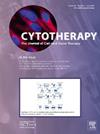Comprehensive characterization of cytopenia after chimeric antigen receptor-T cell infusion in patients with relapsed or refractory multiple myeloma
IF 3.7
3区 医学
Q2 BIOTECHNOLOGY & APPLIED MICROBIOLOGY
引用次数: 0
Abstract
Background
Many studies have demonstrated the effectiveness of chimeric antigen receptor-T (CAR-T) cell therapy for relapsed or refractory multiple myeloma (RRMM), but the hematologic toxicity has not been well characterized.
Methods
A total of 111 adults with RRMM who received BCMA CAR-T cells, BCMA + CD19 CAR-T cells or tandem BCMA/CD19 dual-target (BC19) CAR-T cells infusion were enrolled. We characterized cytopenia and hematologic recovery at different time points after CAR-T-cell therapy, analyzed the effect of cytopenia on prognosis and identified the risk factors.
Results
Patients had a high probability of cytopenia, with anemia, neutropenia and thrombocytopenia occurring in 92%, 95% and 73%, respectively. There were 60 (54%) patients had prolonged hematologic toxicity (PHT) after D28. The median hemoglobin and platelet count were significantly lower at D28 post-CAR-T cell therapy than at baseline. Hemoglobin increased to above baseline at D90. The median absolute neutrophil count was lower than baseline at D0 and D28, and it recovered to baseline at D180. The baseline level of lactate dehydrogenase was associated with thrombocytopenia. Extramedullary involvement was associated with hemoglobin recovery, while the baseline level of albumin and types of CAR-T were related to platelet recovery. Patients with anemia at baseline and at D0, D180 and D360 had shorter progression-free survival (PFS), while anemia at D0, D60, D180 and D360 was associated with shorter overall survival (OS). Neutropenia at D0 was associated with shorter PFS and patients with neutropenia at D90 or D180 had shorter OS. Patients with thrombocytopenia at any time had shorter PFS and OS. Compared to patients without PHT, patients with PHT had shorter PFS and OS.
Conclusions
The majority of RRMM patients treated with CAR-T cells experienced cytopenia. Cytopenia occurred at specific time points was associated with a poorer prognosis.
对复发或难治性多发性骨髓瘤患者输注嵌合抗原受体-T 细胞后细胞减少的综合描述
许多研究都证明了嵌合抗原受体-T(CAR-T)细胞疗法对复发或难治性多发性骨髓瘤(RRMM)的疗效,但其血液学毒性还没有得到很好的描述。我们共登记了 111 名接受 BCMA CAR-T 细胞、BCMA + CD19 CAR-T 细胞或串联 BCMA/CD19 双靶点(BC19)CAR-T 细胞输注的 RRMM 成人患者。我们描述了 CAR-T 细胞治疗后不同时间点的全血细胞减少和血液学恢复情况,分析了全血细胞减少对预后的影响,并确定了风险因素。患者出现细胞减少的概率很高,贫血、中性粒细胞减少和血小板减少的发生率分别为 92%、95% 和 73%。有 60 名(54%)患者在 D28 后出现了长期血液学毒性(PHT)。CAR-T细胞治疗后第28天,血红蛋白和血小板计数的中位数明显低于基线值。D90时,血红蛋白升至基线以上。中性粒细胞绝对计数中位数在D0和D28时低于基线,在D180时恢复到基线。乳酸脱氢酶的基线水平与血小板减少有关。髓外受累与血红蛋白恢复有关,而白蛋白基线水平和CAR-T类型与血小板恢复有关。基线及D0、D180和D360时贫血的患者无进展生存期(PFS)较短,而D0、D60、D180和D360时贫血的患者总生存期(OS)较短。D0时出现中性粒细胞减少与较短的PFS相关,D90或D180时出现中性粒细胞减少的患者OS较短。在任何时间患有血小板减少症的患者的PFS和OS都较短。与无PHT的患者相比,PHT患者的PFS和OS更短。大多数接受 CAR-T 细胞治疗的 RRMM 患者都出现了全血细胞减少。在特定时间点出现的全血细胞减少与较差的预后有关。
本文章由计算机程序翻译,如有差异,请以英文原文为准。
求助全文
约1分钟内获得全文
求助全文
来源期刊

Cytotherapy
医学-生物工程与应用微生物
CiteScore
6.30
自引率
4.40%
发文量
683
审稿时长
49 days
期刊介绍:
The journal brings readers the latest developments in the fast moving field of cellular therapy in man. This includes cell therapy for cancer, immune disorders, inherited diseases, tissue repair and regenerative medicine. The journal covers the science, translational development and treatment with variety of cell types including hematopoietic stem cells, immune cells (dendritic cells, NK, cells, T cells, antigen presenting cells) mesenchymal stromal cells, adipose cells, nerve, muscle, vascular and endothelial cells, and induced pluripotential stem cells. We also welcome manuscripts on subcellular derivatives such as exosomes. A specific focus is on translational research that brings cell therapy to the clinic. Cytotherapy publishes original papers, reviews, position papers editorials, commentaries and letters to the editor. We welcome "Protocols in Cytotherapy" bringing standard operating procedure for production specific cell types for clinical use within the reach of the readership.
 求助内容:
求助内容: 应助结果提醒方式:
应助结果提醒方式:


